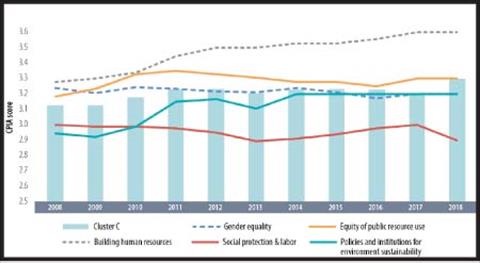The World Bank 2019 Country Policy and Institutional Assessment Report (CPIA), has taken a closer look at debt management as the median government debt to GDP ratio reached 54.9 percent of GDP in 2018 ,an 18.5 percentage point increase since 2013.
It stated that macroeconomic management weakens while social inclusion policies improve slightly and raise concerns over debt sustainability in Africa’s poorest countries who are members of the International Development Association IDA.
The Washington 2019 report indicates
that Africa’s poorest countries saw little to no progress on average in improving the quality of their policy and institutional frameworks in 2018.
It stated that the average CPIA score in Africa’s 38 IDA countries which stands at 3.1 on a scale of 0 to 6 remained unchanged since 2018, with some areas of social policy seeing improvement whilst macroeconomic management weakens.
“The rule of law, accountability, transparency and the quality of public administration remain to be major areas that impede the efficient use of public resources across the region,” the report stated.
The chief economist of World Bank, Albert Zeufack, stated in this report that some African countries are at the risk of mortgaging their people’s future in favour of today’s consumption.
“When countries spend most of their revenue on servicing debts, fewer resources would be left for education, health and critical services for their people and this stops progress in its tracks, he warned.
“The increase in debt levels paired with shift of external debt toward more market based; more expensive and riskier sources of finance have increase debt vulnerabilities substantially among IDA countries in sub-Saharan Africa, he reveals.”
The report recommends that countries improve their debt management capabilities and systems which can enhance transparency and help to stabilise the economy in the long term.
The report also acknowledges that fragile countries in sub-Saharan Africa have improved in the areas of gender equality, human development and environment stability, which it says bodes well for their ability to tackle the drivers of conflict and exclusion.






